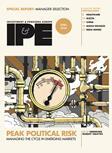The approach Investors take towards environmental, social, and governance (ESG) policies should evolve from risk reduction to actively picking companies with potential revolutionary impact, delegates were told at the IPE Summer Pensions Congress 2020, a virtual event held this week.
“Risk-reduction, [meaning] ‘don’t pollute, be a good neighbour, have good business practices around your governance’, is a good starting point but the potential is much greater: identify companies with the ability to be transformative relatively early in the cycle,” said Cooper Abbott, chair and president of Carillon Tower Advisers.
The return opportunities of certain companies should not be underestimated, he added. In unusual times, the challenge remains for investors to generate returns that make “society and markets better”, he said.
ESG is an opportunity to be “double or triple active”, advocate changes and to use “the power of capital to raise questions of business management,” Abbott continued.
Investors are uniquely positioned to address the societal component of ESG policies, too.
“People have started to see the direct impact of a different view on the economy,” he said, adding that the question is how to incorporate a changed perception in investments.
Asset allocators face a new reality, with public spending spiking and an unprecedented role of the government that will likely last for a longer period of time, event participants were told.
As a result, Abbott said, investment strategies in the next decades will likely go through changes compared to the framework used in the past 10 years.
There are “expectations for lower returns and more challenging to achieve. We hear clients question whether equity dividends can be a supplement for fixed income, really looking at cross correlation industries to try to understand where you get the real diversification benefit,” Abbott added.
For fund managers, the framework to ensure long-term value includes employers’ health and safety, being fiduciary to clients, nurturing investment talents, and thinking creatively but carefully to add potential clients, explained Sarah Williamson, CEO of Focusing Capital on the Long Term (FCLT) Global.
“This crisis has brought to the fore the importance of human capital, the importance of diversity, the importance of having different views, and different ways of thinking about risk management, for example, and I don’t think we can unlearn that,” she said.
The pandemic has also opened doors to build new economies, industries and ultimately opportunities.
“Business models are changing, the pandemic is pulling digitalization forwards, the role of medicine, the technology is bringing a lot of things forward,” Abbott told delegates, adding that the question is how to channel changes to make the overall economy stronger.
“I am confident that while it will be more challenging, we will still get the results together”, with a collaborative approach, he added.
On ESG, the transatlantic divide deepens, with the US and Europe going in two different directions, event delegates were told.
Last month, the US Department of Labour proposed a rule to provide clarity for plan fiduciaries in light of recent trends involving ESG investing.
Based on the new regulation, plan fiduciaries can select investments based on financial considerations relevant to the risk-adjusted economic value of a particular investment, and ESG factors can be considered pecuniary factors only if they present economic risks or opportunities that qualified investment professionals would treat as material economic considerations under generally accepted investment theories.
“Beneficiaries want to receive their pension payments many years into the future and if you have that kind of timeframe, ignoring trends like climate change or societal trends, is a violation of the fiduciary duty,” Williamson said.











No comments yet